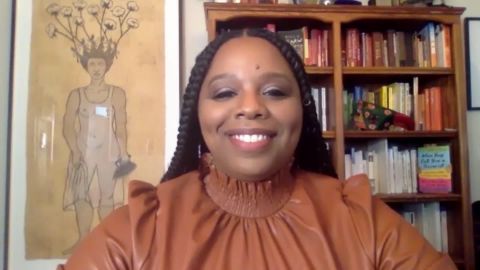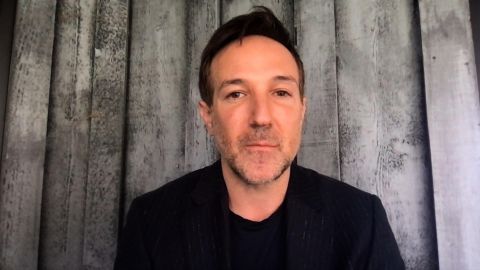Read Transcript EXPAND
CHRISTIANE AMANPOUR: Now, in the United States, the Black Lives Matter movement started long before this summer’s reckoning with racism, but months of protests after the killing of George Floyd put racial justice front and center back into U.S. politics. Patrisse Cullors is founder of the Black Lives Matter movement and she wants to meet the incoming administration. Here she is speaking to our Michel Martin about how they mobilized the black vote in this election and what defund the police really means.
(BEGIN VIDEOTAPE)
MICHEL MARTIN: Thanks, Christiane. Patrisse —
PATRISSE CULLORS, CO-FOUNDER AND EXECUTIVE DIRECTOR, BLACK LIVES MATTER: Thanks for having me. I’m so glad to be back with you.
MARTIN: Thank you. Likewise. So, now, people know about Black Lives Matter as a movement, but I would like you to bring us up to date on how you sort of solidified Black Lives Matter as an organizing tool. How would you describe your impact on the election? Like what do you think was the major result of your efforts?
CULLORS: We played a very specific role in this elections cycle. We did not stand down. We actually stood up and we created a multimillion dollar get out the vote campaign. Where we focused on black cities and black towns across the country, including swing states. We reached over 60 million people in that effort, both by ads, phone banking, texting, and by doing drive-in events across the country. I think our movement and I think our organization alongside black-led organizers across the country won this election. I do not think we would have been able to have a Biden/Harris ticket if it weren’t for black-led organizations and black organizers. We played a really important role. From the very beginning we understood that we were going to have to help get black people out to vote and we’re going to have to push black folks to make sure that we voted for the Biden/Harris ticket. We did this under the Black Lives Matter pact. And so, we started a pact where we could do political work. And that was very, very important for us.
MARTIN: So, the results of this election are mixed. Your preferred candidate, Joe Biden/Kamala Harris won the White House, that Democrats increase their numbers in the Senate, but they lost ground in the House and in state legislatures. Republicans now control more state legislatures than at any time in U.S. history. If you can claim credit to the victory, are you willing to take any ownership of the defeats?
CULLORS: You know, I don’t think we should take ownership of the defeats only because I think what we’ve seen specifically with the Republican Party is a really savvy messaging campaign that demonizes Black Lives Matter and aligns the Democratic Party with that demonization. What I haven’t seen from the Democratic Party in particular is that same sort of savvy response. And so, I do think the Democratic Party should lean on groups like Black Lives Matter. You know, we made the effort to lean into the presidential race, and we really do need the Democratic Party to reach out to us because we can, I believe, win these other races if they leaned on us just a bit more.
MARTIN: When I say — let’s talk about that for a minute because you know that there’s a big discussion about that right now among elected Democrats. I know that you’re sort of familiar with one of the Democratic representatives, Abigail Spanberger, of Virginia who had a tougher race than, I think, that perhaps, she was expecting. You know, now, I think the audio has emerged, there was a kind of conference call where some of the Democrats who considered themselves centrists were saying that, you know, that part of the reason Democrats lost ground in the House was that they leaned too far into language like defund the police and socialism and all this. So, how do you respond to that?
CULLORS: That’s not true. Most of the folks who lost did not lean into the fight around defund and did not lead into a more prerogative fight that has been on the ground. And so, I think, you know, now is the time not to blame the people who helped get us a Biden/Harris ticket. Now is the time to lean on those people and say, hey, how did you do it for this presidential election? Can you come help us do it here at our home and the local elections? And I think that will benefit the Democratic Party way more than they actually understand.
MARTIN: So, I think her argument is she absolutely didn’t lean into defund the police and any of those issues when her argument was that they basically hung those labels on Democrats who didn’t even embrace them. And in fact, as you said, I think they would agree that they demonized Black Lives Matter. How do you defend against that? Do you?
CULLORS: I think it’s the wrong question. I think, you know, what we need from the Democratic Party is allyship right now and we need to actually be working together. And I think the Democratic Party hasn’t always engaged our movement in a meaningful way. So, of course, the Republicans are going to win if you don’t have any engagement with the real human beings who are leading the defund movement. The moment someone hears me explain defund off of the — you know, outside of the slogan, away from the Republican Party rhetoric, they say, oh, that makes much more sense. And so, if there were more alignment, think about AOC, you know, Ilhan, Ayanna Pressley, Rashida Tlaib, Cory Bush, Jamaal Bowman, this entire squad did not step away or push back against the movement, they leaned into the movement. They —
MARTIN: Except that they are — excuse me. Patrisse, these are Democrats in state democratic seats. These are Democrats who won their seats by primarying other Democrats who they did not feel were doing the job and that’s where — so, you’re not talking about people in swing districts. Look, 70 million people voted for the incumbent.
CULLORS: Yes.
MARTIN: OK. 76 million people voted for the challenger, for Joe Biden. It could be as many 80 by time all of us are counted. But the reality of it is 70 million people voted for the incumbent and the Senate is going to be 50- 50 Senate. So, the question then becomes is, how do you make your case to half of the country that either doesn’t agree with you or has been successfully persuaded to hate you?
CULLORS: So, we persuade folks to actually vote for us. This is what my argument is. My argument is, these Democrats did not actually lean into the movement. So, they were — the movement was used against them. The movement was also used against us. But instead of aligning with us, sitting with us, talking with us, they have rebuked us. That’s also not helpful. It’s not helpful to say, well, we lost because of this them, but you’ve never actually sat with us to help us figure out if we can work together. We don’t have that other option as part of the option because the only way that many of these Democrats have talked about us is also demonizing us, and that’s what my argument is. We have to try something different. The Democratic Party can’t continue to just say that Black Lives Matter or a movement is losing, is contributing to their losses without actually doing a deep dive into what made them lose. Representative AOC said something really powerful. She said, I did a deeper dive into this argument that the Democratic Party lost because of Black Lives Matter and defund rhetoric. In fact, she said she looked into those races where the Republican Party had a much savvier campaign plan than the Democratic Party, both in the digital space but also in the ad persuasion space. And so, I don’t think it’s fair to blame us. And I think it actually is a distraction to blame Black Lives Matter for the Democratic losses. I think it creates more in-fighting when we don’t have to fight. We have to work together. We have many years, four years of just terrible policies that we have to undo. And the Democratic Party cannot do it alone. They need all of us.
MARTIN: Not that you’re responsible for running all these people’s races, but what would have been the right way to address the demonization of Black Lives Matter, the — kind of the weaponization of it, as it were?
CULLORS: The way we did it, the way Black Lives Matter did it, is we ran counter ads that actually look at the human beings behind Black Lives Matter that reminded people everyone who wants to talk about, you know, MLK and everyone that wants to talk about the civil rights movement, that this is the modern day civil rights movement. Part of what this is the right has mass media in Fox. The right has all of their right-wing magazines and blogs that actually really purport the same messaging. They’re very good at spouting out one to two messages and then hitting us on the head with it. We’re not very good at that. And so, we have to do a better job of persuading people why we believe the things we believe. And how they’re not just going to benefit black people but how they’re going to benefit everybody.
MARTIN: Before we move on to other subjects, because I do want to talk about the meeting you requested with the incoming administration is, is there any space in the Black Lives Matter movement for disagreement over the slogan, defund the police?
CULLORS: Absolutely. Listen, I’ll say two things on this. Number one, when we came up with Black Lives Matter, the slogan, everybody told that it was divisive. Everybody told us that the Black Lives Matter slogan is going to scare people away, that we were divisive, why are we saying black lives matter, why don’t we say all lives matter? And we said over and over again, it is OK to specify the need for the black community. Every other community gets to do it. Every other community gets to talk about their specific needs. And now, in 2020, we have Netflix, Amazon and every other corporation saying Black Lives Matter on every screen. Defund the police is a very similar slogan in that it elicits same kind of response. People are like, why would you say that? Why are you communicating that? Why don’t you use another term? I don’t think that just because a term scares people that you don’t use it. I think you use a term and then you explain it. You explain why a community is calling for defunding. Because I’ll say this. We all know what defunding means. The right has defunded education. The right has defunded folks’ access to adequate housing. The right has defunded and divested from health care. So, the defund slogan only elicits a kind of response, a fear response, because it’s specifically about law enforcement. And nobody ever wants to challenge what law enforcement does because when they do it to black people, people don’t care. So, I think this conversation about defund needs to be — needs to have more nuance and people need to stop playing like they don’t understand what it means. Because what we are asking for is a reallocation of dollars into a social service network that will actually care for the human beings that have been uncared for for over 400 years.
MARTIN: You asked for a meeting with the Biden/Harris administration. What are you seeking specifically? Do you have some specific type of engagement in mind?
CULLORS: Absolutely. We’d love to sit with them as they are transitioning into elected office. We know what the base of black people want and need. We’ve been working with black folks for years on many different issues. Our organization specifically wants to talk with them about the issues around police violence and mass incarceration. We know that their administration has said they’re not interested in defunding. But their administration hasn’t actually talked to the movement around what we mean by defunding and what we mean by reallocating funds. And so, we’d love to be engaged in a meaningful way to talk about those issues. And lastly, we want them to pass the BREATHE Act. We want them to look at the modern-day civil rights legislation that we created with the movement from black lives to really make sure that the BREATHE Act becomes a reality.
MARTIN: And what does that do? What would it do?
CULLORS: The BREATHE Act is one of the first initiatives that will wholeheartedly look at divesting out of law enforcement and reinvesting into our communities. And so, it’s 100-plus page document and bill that details all of the ways that our communities can have access to healthy food, access to adequate education, access to jobs. And we believe that the federal government can help move that forward for us.
MARTIN: Do you have any fears, if I may put it that way, in that, you know, there are those, particularly in a progressive movement, who argue that the Obama administration in a way laid the groundwork for the Trump administration for reasons that he couldn’t control, which is racism, but some things he could have, perhaps, controlled, i.e., that people didn’t see enough change in their own lives, that made them believe change, in fact, is possible? Do you have any fears?
CULLORS: I do. But my biggest fear is will the country, America, ever want to change? Will it truly want to transform out of being a racist, sexist country? I don’t think that happens with one leader. I don’t think that happens with one party. I don’t think that happens with one president. It’s why Black Lives Matter started under Obama. Because we didn’t see enough change. We didn’t feel the change. We were still experiencing so much of the traumas of racism in this country. And so, we have a lot of work to do. I do not believe Biden and Harris are saviors. I don’t think they’ll be able to undo 400 years. I don’t know if they’re trying to undo 400 years. But our job as leaders, as movement leaders, is to push them. And it’s to also push our local electeds, our statewide electeds because there’s so much more than just the presidential seat and the vice-presidential seat. Here in Los Angeles County, we were able to get out D.A. Jackie Lacey, a D.A. that had been upholding racism, racist policies, racist ethics inside of our county for so long. We replaced her with a progressive district attorney. And so, need all elected officials, we need all people to show up for this moment. And it’s not just going to be the president and the vice president.
MARTIN: Do you ever, Patrisse, allow yourself to consider that some people don’t think Black Lives Matter?
CULLORS: I do.
MARTIN: And how do you deal with that?
CULLORS: Yes. I do. I get death threats every day reminding me that black lives don’t matter and that folks are willing to kill and maim and abuse, you know, black people. How I deal with it is by being inside of the movement. How I deal with it is by fighting every single day, and sometimes winning. You know, we have to claim our victories. We have to celebrate when we win. And reminding myself that I’m building a future not just for me, but for my children and my children’s children and their children’s children.
MARTIN: There are people who really do believe that, you know, the expression of Black Lives Matter is anti-white. And do you have a message for them?
CULLORS: Yes. I know that when white people historically have said they’re pro-white, it is meant they are anti-black. And so, it must be very confusing to hear black people say, we are pro-black and that does not mean we are anti anything else. But the reality is that black people’s pro- blackness is about the liberation not just of black people but everybody. We deeply believe that when black lives actually matter, everybody’s lives will also matter. And so, that is my message to, you know, white folks in particular who are — who really do rely on racism. That racism that you rely on, while it may benefit you in the short term, that is no way to live. That’s no way to live your life and it’s no way to teach your children to live. And so, there’s so much more room when we embrace an anti-racist philosophy. So much more room for humanity.
MARTIN: Patrisse Cullors, thank you so much for joining us.
CULLORS: Thank you so much for having me.
About This Episode EXPAND
Hatice Cengiz; Bryan Fogel; Ronen Bergman; Patrice Cullors
LEARN MORE



